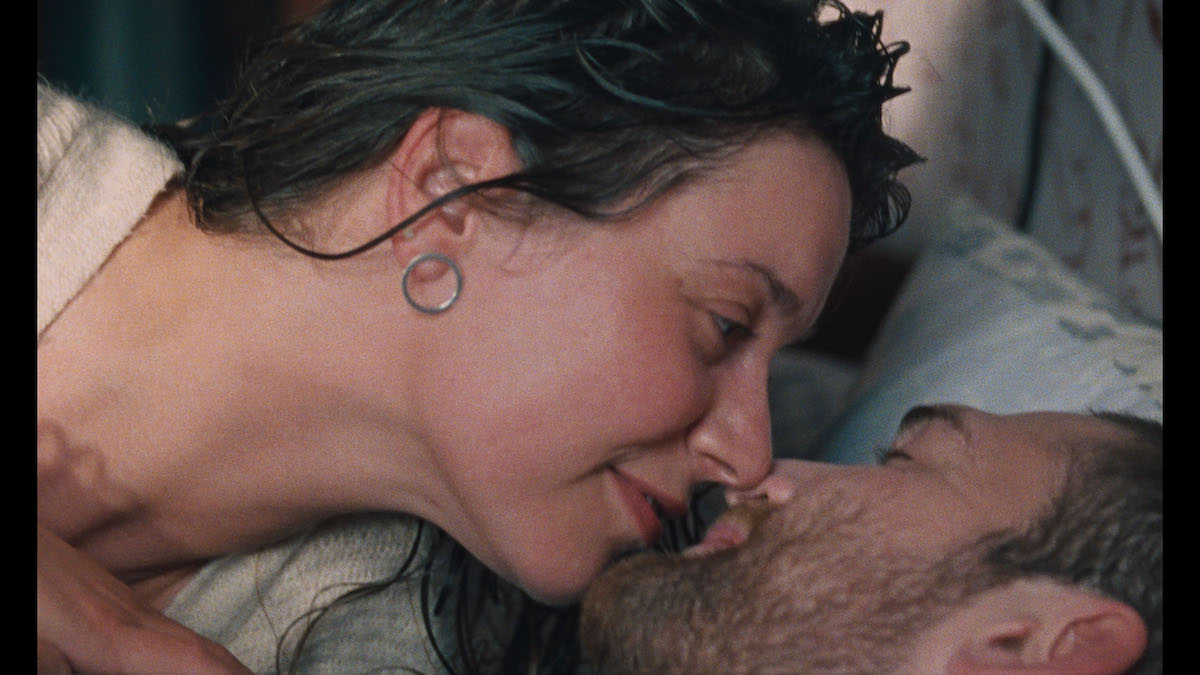Washington, D.C., Feb 3 – In her film Slow, which premiered at the 2023 Sundance Festival, writer/director Marija Kavtaradze offers a tender study of two messy people’s humanity. Contemporary dancer Elena (Greta Grinevičiūtė) meets Dovydas (Kęstutis Cicėnas), who’s assigned to interpret for her class of deaf youth. As their connection deepens, Dovydas discloses that he’s asexual—which takes Elena by surprise. The two individuals then enter a relationship dance testing their boundaries and definitions of sexuality, intimacy, and love.
The film’s analog style is mesmerizing. The slight grain and muted pastel colors evoke nostalgia of a first love, which Kavtaradze emphasizes through her pared-down filmmaking approach. By focusing on the way the body moves through its environment, the film creates raw, honest moments and forces viewers to pay careful attention to Elena and Dovydas’ exchanges, such as their body language, facial expressions, and tone. Otherwise, the audience could miss subtle hints of the character’s feelings. A flicker of sorrow, moment of hope, flash of annoyance.
Although Elena and Dovydas develop a close connection, Elena can’t seem to let go of what a “normal” relationship looks like. In the first half of Slow, she tells Dovydas that she “want[s] [them] to be normal,” which causes him to scoff. Later in the film, after Doyvdas attends Elena’s dance show and meets her colleagues, he asks her if she misses her life prior to meeting him. Sometimes, she says, like “that look when you know someone’s truly into you.” While Elena shares her feelings, oblivious to Dovydas’ reaction, the camera cuts to his downcast face. He seems hurt because Elena wants to be loved in a specific way that his asexuality can’t meet.
Funnily enough, Kavtaradze seems aware that some viewers may blame Elena’s selfishness and insensitivity for coming between the couple. To give more context to Elena’s actions, Kavtaradze includes a scene where Elena reluctantly invites Dovydas over to her mom’s house. The first notable detail about the house is how dark, drab, and brown it appears. The mom-daughter interaction also feels tense since Elena harbors resentment towards her mom and brings up specific negative memories throughout the conversation, suggesting they share a strained relationship.
As I watch Elena and Dovydas tiptoe, glide, and stumble throughout Slow, I can’t help but draw connections between asexuality and disability. Both are heavily underrepresented and misunderstood in popular culture. Both are not considered “normal” in society. Elena’s desire for a “normal” relationship is not the primary source of conflict in their relationship. Rather, it is society’s standards of normalcy that influence her thoughts of sexuality and love, leading her to comment on her unique relationship with Dovydas, thus causing him to feel insecure at times and try to prove himself.
The idea of normalcy stems from the social model of disability, in which the issue does not lie in the disabled or deaf person. The issue is that that society disables them by not making the environment accessible or inclusive, setting an erroneous norm that disability is something to overcome. By perpetuating this message, whether it be through media or policy, individuals come to internalize misguided beliefs, like Elena has.
Given this framework, Elena and Dovydas’ relationship acts as a microcosm of society’s attitudes towards those who are not “normal.” It reinforces the importance of uplifting marginalized communities and portraying authentic representation through media. Among the everyday joys and complications of relationships, the intimate filmmaking approach in Slow points to the larger ideas that can unite, or divide, individuals in their pursuit for love.








